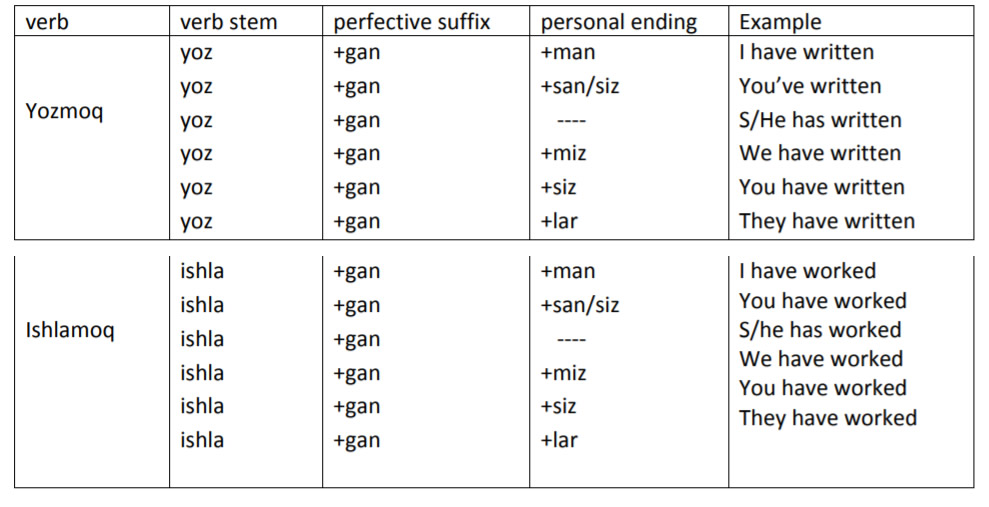Difference between revisions of "Language/Northern-uzbek/Grammar/Present-Perfect-Tense"
m (Quick edit) |
|||
| (6 intermediate revisions by 3 users not shown) | |||
| Line 1: | Line 1: | ||
<div | <div class="pg_page_title">Present Perfect Tense. Tugallangan hozirgi zamon </div> | ||
[[File:Uzbek-Language-PolyglotClub.png|thumb]] | |||
<code>V + gan + personal ending</code> | <code>V + gan + personal ending</code> | ||
This form is used to express action happened in the indefinite past with no specific time frame or dates. It is formed by adding to the verb stem the suffix -GAN, plus the pronominal type of personal suffixes. | This form is used to express action happened in the indefinite past with no specific time frame or dates. It is formed by adding to the verb stem the suffix -GAN, plus the pronominal type of personal suffixes. | ||
[[File:Uzbek-Present-Perfect-Tense-PolyglotClub.jpg]] | [[File:Uzbek-Present-Perfect-Tense-PolyglotClub.jpg]] | ||
For example: | For example: | ||
| Line 20: | Line 13: | ||
*Biz Samarqandda ishlaganmiz. | *Biz Samarqandda ishlaganmiz. | ||
*Eshikni ochgan bola kim? | *Eshikni ochgan bola kim? | ||
If the verb stem ends with -k or -g, a phonetic assimilation rule changes the suffix into -KAN. In the same way, if the verb stem ends with -q or -g', the suffix is changed into -QAN. For example, with the verb tegmoq, 'to touch': | If the verb stem ends with -k or -g, a phonetic assimilation rule changes the suffix into -KAN. In the same way, if the verb stem ends with -q or -g', the suffix is changed into -QAN. For example, with the verb tegmoq, 'to touch': | ||
| Line 31: | Line 23: | ||
*tekkanlar / tekkan - They have touched | *tekkanlar / tekkan - They have touched | ||
<span link>With the completion of this lesson, consider investigating these related pages:</span> [[Language/Northern-uzbek/Grammar/Pronouns|Pronouns]], [[Language/Northern-uzbek/Grammar/Future-Tense|Future Tense]], [[Language/Northern-uzbek/Grammar/How-to-Use-Have|How to Use Have]] & [[Language/Northern-uzbek/Grammar/Past-Perfect-Tense|Past Perfect Tense]]. | |||
==Interrogative form == | ==Interrogative form == | ||
| Line 36: | Line 29: | ||
[[File:Uzbek-Present-Perfect-Tense-Interrogative-Form-PolyglotClub.jpg]] | [[File:Uzbek-Present-Perfect-Tense-Interrogative-Form-PolyglotClub.jpg]] | ||
For example: | |||
*Samarqanda bo’lganmisiz? Laylo uy vazifani qilganmi? | |||
==Sources== | ==Sources== | ||
https://slaviccenters.duke.edu/sites/slaviccenters.duke.edu/files/file-attachments/uzbek.original.pdf | https://slaviccenters.duke.edu/sites/slaviccenters.duke.edu/files/file-attachments/uzbek.original.pdf | ||
==Other Lessons== | |||
* [[Language/Northern-uzbek/Grammar/Conditional-Mood|Conditional Mood]] | |||
* [[Language/Northern-uzbek/Grammar/Past-Tense|Past Tense]] | |||
* [[Language/Northern-uzbek/Grammar/Plural|Plural]] | |||
* [[Language/Northern-uzbek/Grammar/Pronouns|Pronouns]] | |||
* [[Language/Northern-uzbek/Grammar/Formal-and-informal-YOU|Formal and informal YOU]] | |||
* [[Language/Northern-uzbek/Grammar/Imperative-of-verbs|Imperative of verbs]] | |||
* [[Language/Northern-uzbek/Grammar/Sentence-structure|Sentence structure]] | |||
* [[Language/Northern-uzbek/Grammar/Plurals|Plurals]] | |||
* [[Language/Northern-uzbek/Grammar/Present-Continuous-Tense|Present Continuous Tense]] | |||
<span links></span> | |||
Latest revision as of 13:06, 27 March 2023
V + gan + personal ending
This form is used to express action happened in the indefinite past with no specific time frame or dates. It is formed by adding to the verb stem the suffix -GAN, plus the pronominal type of personal suffixes.
For example:
- Men xat yozganman.
- U o’zbek tilini o’rgangan.
- Biz Samarqandda ishlaganmiz.
- Eshikni ochgan bola kim?
If the verb stem ends with -k or -g, a phonetic assimilation rule changes the suffix into -KAN. In the same way, if the verb stem ends with -q or -g', the suffix is changed into -QAN. For example, with the verb tegmoq, 'to touch':
- tekkanman - I have touched
- tekkansan - You have touched
- tekkan - He/she/it has touched
- tekkanmiz - We have touched
- tekkansiz - You have touched
- tekkanlar / tekkan - They have touched
With the completion of this lesson, consider investigating these related pages: Pronouns, Future Tense, How to Use Have & Past Perfect Tense.
Interrogative form[edit | edit source]
Note, that in interrogative sentences for subjects men and biz the suffix –mi is added after personal endings.
For example:
- Samarqanda bo’lganmisiz? Laylo uy vazifani qilganmi?
Sources[edit | edit source]
Other Lessons[edit | edit source]
- Conditional Mood
- Past Tense
- Plural
- Pronouns
- Formal and informal YOU
- Imperative of verbs
- Sentence structure
- Plurals
- Present Continuous Tense


